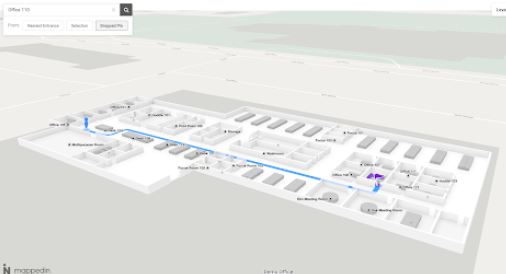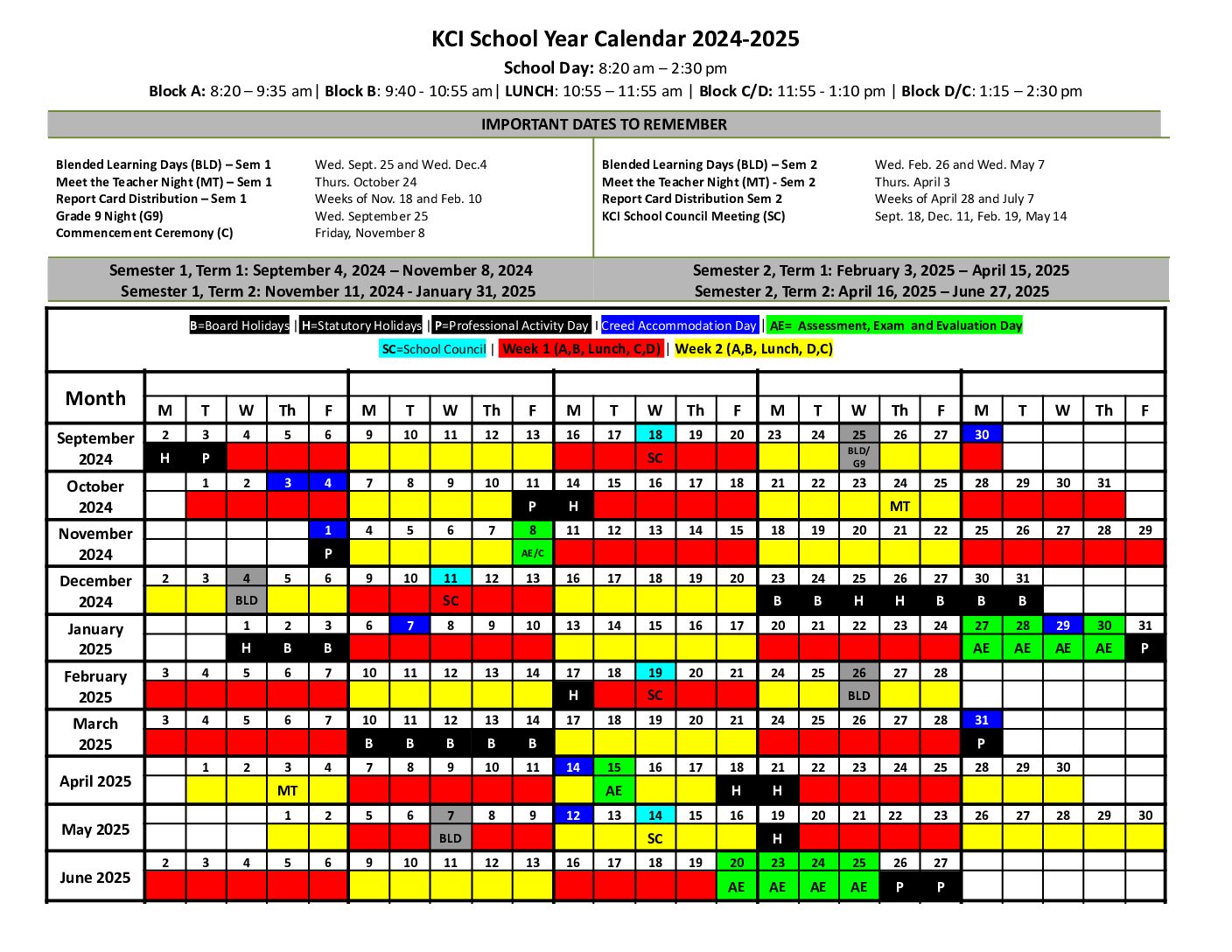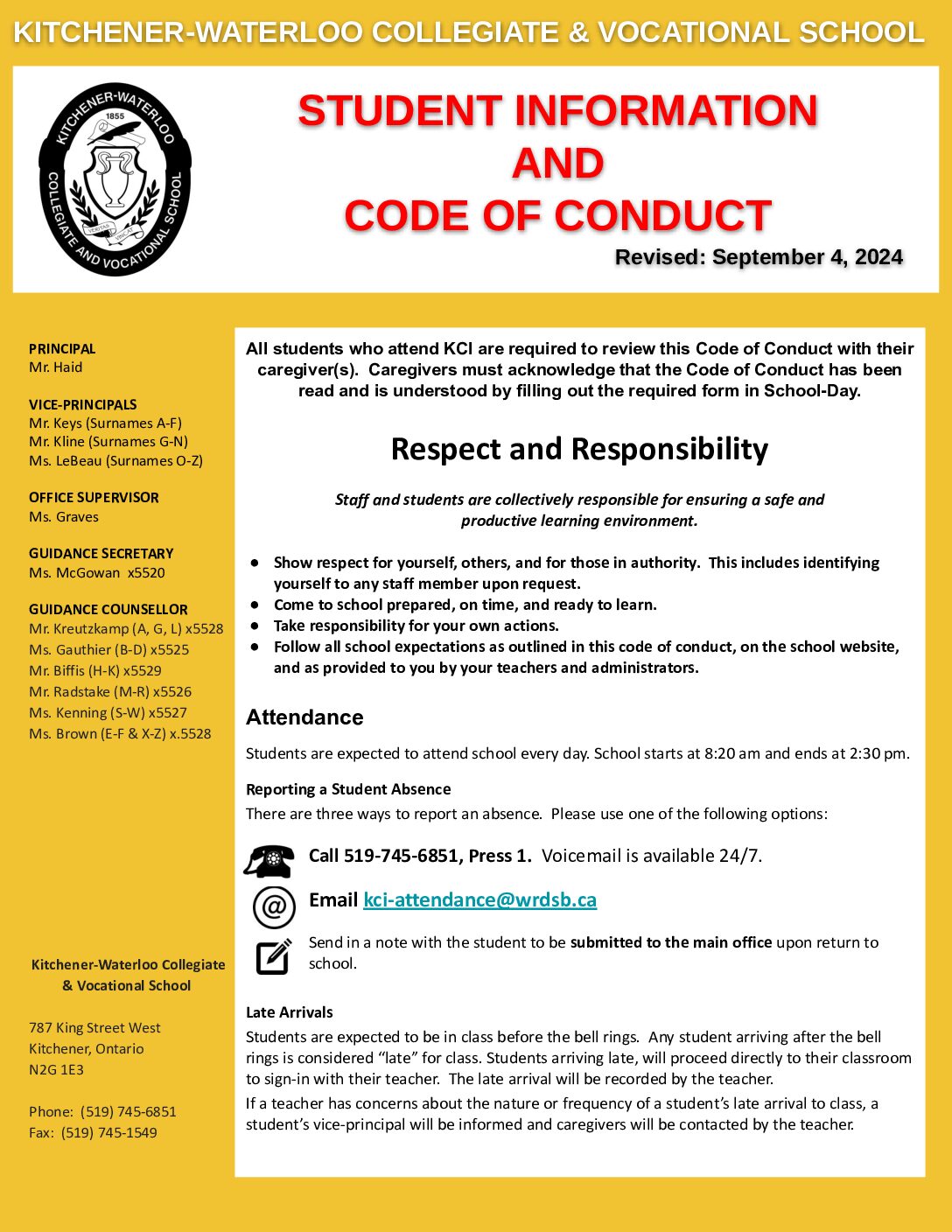
What is Cooperative Education?
Co-operative Education (Co-op) is a structured experiential learning course allowing students to gain valuable work experience within local universities, businesses, industries, research facilities and/or community service organizations.
The course is designed to compliment students’ personal strengths, interests and educational needs. Students participate in a workplace setting while exploring a possible career choice.
How do I get enrolled in Co-op?
If you are 16 years of age and have earned 16 credits, talk to your guidance counsellor, your co-op teacher or go to the co-op office.
Where can I work?
The Waterloo Region District School Board offers its teachers a database of over 9,000 jobs that are available. Your co-op teacher will assist you in finding the right placement based on your skills, interests, experience and courses taken at KCI.
If I am good in English, where could I work in co-op?
You could gain valuable work experience in journalism, or volunteering at either WLU or U of W.
What other benefits does Co-op offer ?
1. You will earn multiple credits towards your high school diploma. Two Co-op credits can fulfill the OSSD compulsory requirements.
2. Confirm career decisions before starting post-secondary education.
3. Develop marketable skills necessary for success in the workplace.
4. Maintain a high level of commitment to the workplace and be considered for the workplace earning part-time status and dollars after your co-op placement obligations.
The student participates in 3 components of the course:
1) Pre-placement – three weeks instruction is provided on health and safety, workplace ethics, human rights, confidentiality, resume development and interview skills.
2) Work Placement –for 16 weeks the students work in a career area of their choice under the supervision and training of a skilled worker
3) Integration – opportunity for students to analyze and share their workplace experiences, techniques and principles learned at the placement
Students with a minimum of 15 credits are encouraged to apply to the co-operative education program. Co-op provides students with the opportunity to:
- test drive a career (confirm your career choice before choosing your post-secondary destination)
- build skills by working one on one with a co-worker
- attain hands on experience
- overcome the problem of “no job without experience and no experience without a job” by putting real work on your résumé.
The Ministry of Education endorses co-operative education as an integral part of any high school program. Up to two credits in co-operative education can count towards the 18 compulsory credits needed to earn a high school diploma.
- Students can add 1 additional credit in English, or French as a second language, or a Native language, or a classical or an international language, or social sciences and the humanities, or Canadian and world studies, or guidance and career education, or cooperative education**
- In addition is 1 additional credit additional credit in health and physical education, or the arts, or business studies, or cooperative education**
- New is 1 additional credit additional credit in science (Grade 11 or 12), or technological education, or computer studies, or cooperative education
Students in a co-operative education course have the opportunity to:
- develop personal management skills such as teamwork and communication
- increase job-specific and technical skills
- earn hours towards an apprenticeship and/or be signed on for an apprenticeship
- secure references from local employers in their chosen fields
- gather evidence that may be used to enhance their employment portfolios
- develop a network of contacts in their fields of interest
- gaining practical work-experience in particular field will enhance their applications to specialty programs at the college or university level
Co-operative Education allows you to:
- build many important and helpful relationships
- get prepared for your future career
- use a variety of skills to complete many tasks
- participate in creating amazing memories
Co-Op Program Outline
Program Objectives
- Students will gain practical work experience and transferable, marketable skills while earning credits towards graduation.
- Students will generate a positive attitude for work and increase self-confidence.
- Students will establish appropriate career goals and ease the transition from secondary school to further education or work.
- Students will gain practical experience with technology and other workplace equipment.
- Students will develop appropriate interpersonal skills.
- Students will form a positive work ethic.
Program Components
The Co-op Program is divided into 3 components:
- Pre-Placement
- Work Placement
- In-class Integration
The Pre-Placement Component
All Co-operative Education students participate in a pre-placement session of approximately 20 – 30 hours that emphasizes skills necessary to succeed in a competitive interview process and to begin a new job. The pre-placement component has students in the classroom each day for 2 full periods for approximately 3-4 weeks (depending on when the student finds a placement). Topics covered in pre-employment include:
- Expectations of Co-op
- Job Preparation
- Self-Assessment/Personality Dimensions
- Resume writing / Cover Letters / Application Forms
- The Job Interview
- Health and Safety
- Human Rights and Harassment
- Logs / Journal Writing
The Work Placement Component
It is the responsibility of the student to ensure that the total number of co-op hours (minimum of 180 hours) is attained and to complete the contract according to the date written on the work education agreement. Students usually spend half days (a.m. or p.m.) at the work placement for the semester. This scheduling is dependent on their in-school timetable. In most situations, the students will spend a minimum of 3 – 31/2 hours per day in their work placements. Each employer will receive a calendar outlining in-school days, school holidays and work schedule.
In order to provide the student and the employer with the best possible Co-op experience, a personalized learning plan will be developed by the teacher, the student, and the employer. The plan will outline the work skills, specific tasks, and responsibilities of the student while at the work placement. This plan will be begun by the third week of work placement.
The Co-op teacher will be responsible for monitoring the student at the work placement a minimum of 3 times per credit over the course of the placement. Employers will also complete an evaluation of the initial interview as well as performance appraisals over the work term. Students must complete time sheets and journals every week and return them to the Co-op teacher at the designated location by the designated time.
The Integration Component
While at their workplaces students will return to the classroom one-half day approximately every second week to participate in integration activities. The purpose of integration is to ensure the student is reflecting on a number of issues related to the co-op placement and the experience, and to provide the student with some on-going support and the ability to network and share their experiences with their peers. Topics will include:
- Teamwork and Communication
- Initiative and Positive Attitude
- Conflict Resolution
- Emotional Well- Being
- Effective goal Setting
- Self-Awareness and Self-Image/Esteem
- Successful job search strategies
- Co-op Promotional Poster
- Unions and Federations
- Employer Thank You Reception
Student Responsibilities
In-school Related Responsibilities:
- Regular attendance every day during pre-placement session in September/February as well as integration sessions as scheduled in your outline from your teacher
- Submit weekly activity sheet and journals every Monday
- Submit employer evaluations on the specified dates
- Complete a Co-op Promotional Poster (scheduled once per semester)
Out-of-school Related Responsibilities:
Before students start their placements, they will sign a Work Education Agreement Form, which will outline their responsibilities. These include:
- Regular attendance and punctuality both in school and on-the-job
- Completing all required assignments both in school and on-the-job
- Abiding by the rules of the company where the student is placed as well as school rules and regulations
- Working the agreed-upon hours and dates as per Work Education Agreement Form
- Working in a courteous, honest and business-like manner
- Meeting employer expectations of dress and behaviour
- Adhering to company health and safety standards and regulations
- Notifying training supervisors and co-op teacher well before starting time if unable to report to work due to illness or injury
- Reporting any workplace accidents immediately to both the employer and the teacher
- Maintaining strict confidentiality regarding workplace matters
Employer’s Agreement
When employers agree to accept co-op students at the workplace, they accept several responsibilities. These include:
- Providing the student with the type of training outlined in the PPLP as determined by the teacher and the employer
- Providing a safe working environment and safety instruction
- Accepting the student as a regular trainee and providing a full orientation
- Keeping accurate, signed records of attendance, lates and days absent for evaluation purposes
- Completing a minimum of two student evaluations per term to be shared with the student and submitted by the student as required



